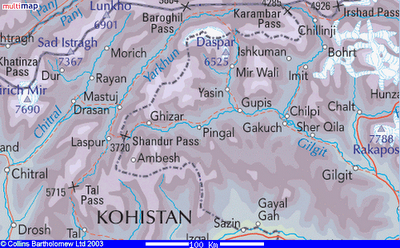My next stop after Chitral was to be Gilgit, the capital of Pakistan's Northern Areas (an area locked in legal limbo due to the ongoing Kashmir conflict, though it does mean that people there don't have to pay taxes). There are only two roads that link the Northern Areas to the rest of Pakistan: the KKH and a jeep track over the Shandur Pass between Chitral and Gilgit. Apart from being the link between the two towns the pass is also home of the world's highest polo ground which hosts the famous (for people who care about that sort of thing), annual Shandur Cup between teams from the two neighbouring regions.

As you can see from the map it's not that far from Chitral to Gilgit, especially as the crow flies. Unfortunately jeeps don't fly. Neither do they glide or hover. They just trundle, and none too quickly at that.
So I was feeling pretty pleased with myself by the end of the first day out of Chitral when I reached the town of Mastuj, not far from the pass itself. The next day started even brighter when I caught a jeep to the town of Laspur in the shadow of a pass, where I hoped to get onward transport. And that's where I stayed for the rest of the day, sitting by the side of the track and waiting. Waiting, waiting, waiting. Occasionally some kids would come by and poke and prod me, or someone would try out their English on me: what's your name? where you from? That being the general extent of their vocabulary. 8 hours later and not a single vehicle sighted (except for local tractors). I finally gave up and began questioning the wisdom of my decision to take this road.
The next morning dawned with the beeping of a jeep's horn and I was off again. The road up and over the pass is perhaps the worst I have ever travelled and the jeep would often lurch precariously close to the yawning precipice at truly sphinctre-puckering angles. But, eventually, we reached the other side. It had taken over 3 hours but it was still only 9 o'clock and I was raring to get to Gilgit. I got a bit suspicious when the driver motioned for me to get off at a hotel as I had asked to be dropped off at the bus stand. But apparently the five daily buses to Gilgit leave between 6 and 8am. The small crowd of locals that had gathered by now all said the same thing, that I should stay the night and catch a bus the next morning, a mantra I would be hearing often that day. Well, I wasn't going to sit around for another day twiddling my thumbs and so I shouldered my backpack and set off towards Gilgit, some 100 miles down the road. A few hours later this was beginning to look like a rather rash choice as I wasn't significantly closer to my goal, I hadn't even seen a car going in my direction, and the dry, shadeless rock walls of the valley were turning it into my own personal oven. My only entertainment was when I would get to a village and all the children would start crowding round and following me like the Pied Piper. I would see how far they would follow me out of their villages before losing interest or fearing to go further.
It was well after one o'clock when I was finally given a lift by some guys from Gilgit who were on a weekend fishing break. They were only going a relatively short distance, but it eased my feet and they offered me some of their picnic lunch. Revitalised and with a slight spring in my step I pushed on. It took another 4 different rides: a truck, a wannabe rally driver, a minivan and a police chief to finally get me to Gilgit some time before 10pm. It had been a long day, but ultimately satisfying because I had achieved what I had set out to do despite many people telling me that it couldn't be done.
The next day though, I was wondering slightly what all the rush was about as Gilgit is a pretty uninspiring town. The sectarian violence between Sunnis and Shias of last year may have died down since then, but there is still a large military presence: you have to pass at least 5 military checkpoints before entering the centre of town and military jeeps with mounted machine guns are a common sight on the streets. The town does have some redeeming qualities such as shops and restaurants (it's nigh impossible to find anything but out-of-date biscuits and chapati and dhal (lentils) in most villages) and also internet access, which is sorely lacking in the mountains of Pakistan.
No comments:
Post a Comment